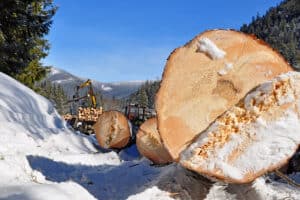As a follow-up from my previous article, “What Does a Consulting Forester Do?”, I thought it might be prudent to take a look at the process of selecting a consulting forester to help you manage your timberland investments. Because most people will have a good idea on how to locate potential candidates, my primary focus will be on things you should consider while sorting out the candidates you have selected in your preliminary search, but first, I will offer a few suggestions on where to get started.
Like any other search, the hunt for a consulting forester will likely begin on the internet. Why shouldn’t it? Almost every piece of information that has ever been recorded is somehow accessible via the internet. The internet does have its downside as well. Depending on how effectively you choose your keywords, your search results can vary wildly. Because of how search engines operate, you may have more irrelevant “results” than viable ones. The best listings could also end up on page 12 of the results, effectively burying them. For those reasons, the internet might be a better place to follow up than to start. Believe it or not, word of mouth is probably the best and most helpful way to locate a few quality candidate companies to manage your land. With word of mouth also comes a personal reference, usually with first-hand knowledge of the quality of work, effectiveness, and personality of the company and its representatives. Absentee owners probably will not have the luxury of talking to their neighbors and other property owners in the community and will likely have to rely more heavily on the internet. Landowner organizations and associations can be another source of help. Their publications and websites will be full of advertisements and advice about land ownership. Many of these organizations will also have regular meetings in your local area, giving you a chance to network and share experiences with other landowners in your area. However you choose to go about your search, here are three things to consider when sorting through the short list of consulting companies.
- Is the company local? Do they manage land near your property? Location is important not only because it will allow them to keep a closer eye on the land, but also because timber markets can vary quite a bit over distances as little as 75-100 miles so you need to make sure that they are familiar with the area before you hire them. Also, the farther they have to drive to get to your land, the greater the cost will be to you.
- Find out the type of client the company typically works with. A large company will likely want to focus on large clients with thousands or even tens of thousands of acres. If your ownership is more easily measured in the hundreds or even tens of acres, they probably will not be a good fit.
- Find out if the company you are talking to has any obligations or affiliations that might conflict with your best interests. By that I mainly mean, find out if they buy or cut timber. A lot of timber buyers or wood dealers also manage property as a way to add to their business. Most of them are honest people and do good work; however, landowners often are not aware of the actual costs associated with this type of relationship. While he may not be charging you a commission for the timber he is cutting on your property, you can rest assured that you are still paying him by receiving lower stumpage prices for your timber. The problem here is that if you don’t have it on paper in front of you. How would you know if he is paying himself fairly if you have no idea what the mill is paying for the delivered timber and what the logging contractor is being paid to haul it? Could he pay you more if you sold the timber at a different time of year? For me, it would be a major red flag if someone refused or avoided answering these types of questions. I am not by any means suggesting that if you have a timber buyer managing your property that you are somehow being cheated or that you should fire them immediately, but, you need to be certain that your relationship is completely transparent and honest.
At some point along the lines of your decision making process, you need to verify all the information you have gathered about your favorite company. Contact your states forestry agency and find out if the company has any legal issues concerning the work they have performed in the past. Make sure they do in fact have a license and are qualified to practice forestry in your state. You should go back to the internet and look up their company website, social media pages, blogs etc. and make sure you like how they present themselves to their clients and to the world. Ask for a list of references and actually talk to some of them. While references will tend to be positively biased, any negative response from a reference should be taken to heart. Finally, ask yourself when you talk to the person you will primarily be working with, whether they seem sincere and honest. Do you get along with them?
There are exceptions to much of the advice I have given in this article, following it will not guarantee that you will hire the best person for the job on your first try. Only time and experience can prove whether or not you have made the best selection for your particular situation. Hopefully, in the end, this advice will help you to avoid making some costly mistakes and put you on the path to finding the right partner to help you utilize your land investments to their fullest potential.
This content may not be used or reproduced in any manner whatsoever, in part or in whole, without written permission of LANDTHINK. Use of this content without permission is a violation of federal copyright law. The articles, posts, comments, opinions and information provided by LANDTHINK are for informational and research purposes only and DOES NOT substitute or coincide with the advice of an attorney, accountant, real estate broker or any other licensed real estate professional. LANDTHINK strongly advises visitors and readers to seek their own professional guidance and advice related to buying, investing in or selling real estate.









Add Comment